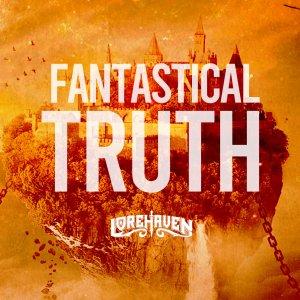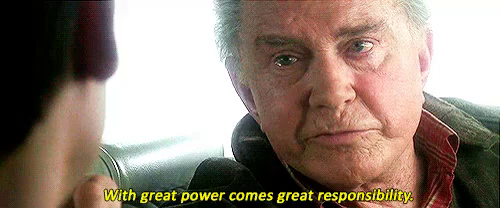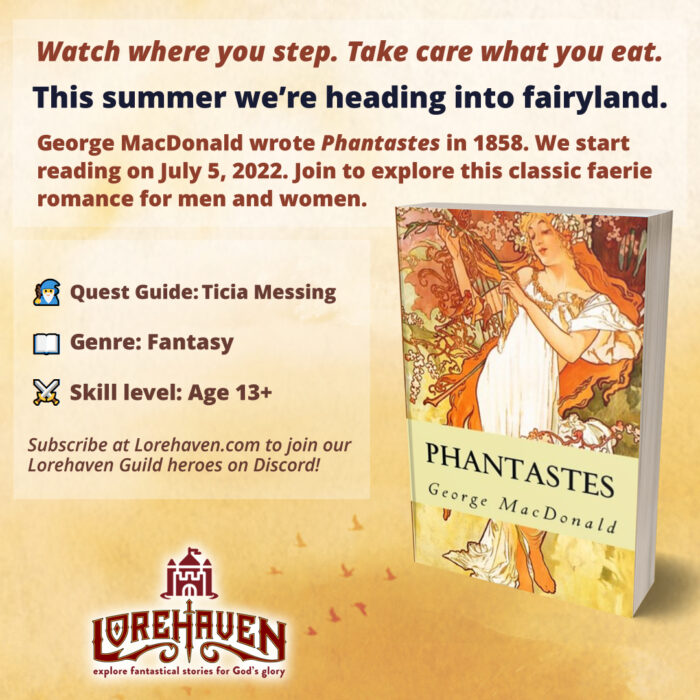Fantastical Truth

120. How Can Christians Enjoy Biblical Freedom in Fiction and Imagination?
Freedom! We all say we believe in this. No one’s out there saying “down with that sort of thing.” But how does the Bible define freedom and how do Christian fantasy fans find this virtue reflected and challenged in our favorite fictions? With cohost Zack Russell taking to the free roads this July, Stephen takes over the studio, launching for a solo show about Galatians 5:13 and one truth all heroes must follow: with great freedom, comes great responsibility.
Subscribe to Lorehaven
articles • news • library • reviews • podcast • gifts • guild
Episode sponsors
- The Wonderland Trials by Sara Ella from Enclave Publishing
- Realm Makers 2022 conference (July 21–23, live and online)
- P. S. Patton’s The Withering (releasing July 26)
Prologue: Why explore freedom and fiction?
- Some of us think about freedom after July 4.
- But some want to define “freedom” a bit wrongly.
- What notions do we accidentally smuggle into “freedom”?
- How can we use “freedom” rightly to enjoy fantastic imagination?
- How can we misuse “freedom” to justify irresponsibility or even plain sin?
Concession stand (with burgers, hot dogs, sausages, salads)
- Given that I’m solo-running the show, this one will likely feel more personal.
- This isn’t systematic theology or counseling. I’m just making observations.
- Part of me wants to engage secular philosophy about liberty, justice, et. al.
- I know a little about this on background, but won’t go into all of that here.
- I do assume parallels between biblical “feasting” and gifts like imagination.
- To sum up: God creates good gifts, like food and creativity, for his glory.
- You can’t have one without the other (or without seeing sin corrupting both).
- Yes, I apply this theme to imagination, yet this has broader applications.
- Finally, this may feel like “meddling”! I am challenging us all, including myself.

Our key verse: Galatians 5:13
For you were called to freedom, brothers. Only do not use your freedom as an opportunity for the flesh, but through love serve one another.
—Galatians 5:13 (ESV)
1. Let’s not ask about stories, ‘Why shouldn’t I enjoy this?’
- This is where this gets the most personal. Because I see a lot of this thought.
- I’ll start with myself. There was a time when I sinfully read Harry Potter books.
- I may have sinned more than usual. I don’t want to be too unkind/kind to myself.
- Did I read them because of evangelical “mystique,” rebelling? Or from joy?
- To my memory, I started with mixed motives, but ended up with better ones.
- That’s why we rely on Christ’s grace to redeem corrupted joys for his glory.
- Lately I see some Christians fans (including authors) asking “why shouldn’t I.”
- They ask, “Why can’t I have this love scene? magic system? violence? belief?”
- I must insist these are the wrong questions to ask. It’s a subculture reaction.
- Similarly, when people angrily defend “rights,” they may act very defensively.
- Or they may assume that we all know the purpose of things (yet really don’t).
- If we accept the “true myth” of the Bible, we must ask more biblical questions.
- On issues of freedom and its purpose, we must let Scripture define our views.
2. Instead, let’s follow Paul’s wisdom about Christian freedom.
 The fuller context of Galatians: believers are being drawn deep into legalism.
The fuller context of Galatians: believers are being drawn deep into legalism.- That meaning may resonate with many younger/other struggling Christians.
- Paul, however, does not insist on enjoying freedom apart from deeper goals.
- Freedom is powerful. God, being the most powerful of all, is the most free.
- We are made in God’s image, but our freedom is not, cannot, be absolute.
- Paul wants freedom, but, “With great [freedom] comes great responsibility.”
- Switching back to July 4 theme, people have always debated this in society.
- We want human freedom, but must also recognize human responsibility.
- If we debate these lines in society, it’s no surprise we do this in imagination.
 3. Based on this truth, let’s ask, ‘Why should I enjoy this story?’
3. Based on this truth, let’s ask, ‘Why should I enjoy this story?’- Note the switch from negative, “why shouldn’t I?” to positive, “why should I?”
- Please understand, you may need to go through the “why shouldn’t I” phase.
- But it is a phase. Like a child learning to probe deeper and practice rhetoric.
- Let’s go back to that point about power. We’ve all seen power being abused.
- Our response must not be fleshly use of our own power, a cycle of abuse.
- Our response is borne of powerful love, which is what Paul emphasizes here.
- You’re made for more: not to resist flawed authorities, but embrace your God.
- Isn’t this the point of the best fantastical stories anyway? To escape yourself?
- The point is also to join fellow-travelers in your feasting and storytelling.
- Again, you’re made for more: not to serve yourself, but to serve other people.
- Imagine eating a feast alone. (You won’t; you’ll watch TV.) This is very lonely.
- You’re made to eat feasts with others, an image Scripture happily endorses.
- Similarly, imagine enjoying a story alone? Not at all. Join others in a quest!
- Example: the ongoing story of Aloy in the game Horizon: Forbidden West.
- Example: both super-team franchises, The Avengers and Justice League.
- Example: any real family or church, or fictional team-up of diverse heroes.
- We all struggle with freedom versus responsibility. Let’s do this together.
- We do all this not for our own pleasure, but for greater satisfaction in Christ.
- Our life’s mission is not rebellion or “freedom.” It’s eternal happiness in him.
Com station
One hero of the Guild remarked about episode 118:
Way back when I was a little [girl], I heard the original “Tilly” audio drama as a rerun. Loved it. I can still vividly remember its twists and emotional impact.
“Prophet” is one of my favorite books. The insights into the news media have served me well, and the supernatural elements are so cool. Also, even if Peretti himself now critiques his use of the abortion issue, I found that it gave me an empathy for those who are on the “other side.”
Another hero shared another life-celebrating story she found:
I’ve been rereading the 27th Protector series which is about girls trained to infiltrate the neighbouring “Republic” and rescue pregnant women and unwanted children. All the babies are made in labs and if you have any kind of defect, they say you can’t experience life properly and are considered unnecessary.
The third book especially deals with a lot of questions of who to save. They had missed some important information that might let them save more lives, but the protagonist ends up realising that chasing after that information means that children she rescued would be dead instead. Do you save the person right in front of you or do you find a way to bring down the whole system that is killing them?
It’s also a story about love. Love needs to be why they’re doing this rescuing. If we hate our enemies more than those we’re trying to save, we’re going to end up making some bad decisions.
 Meanwhile at Lorehaven
Meanwhile at Lorehaven- We’re started our Phantastes book quest in the Guild! Join in for free.
- We’ve shared reviews of The Governess of Greenmere and Jabberwock’s Curse.
- This week, Josiah DeGraaf explores best ways to support Christian-made fantasy.
- Later this month, Stephen heads for Realm Makers (yet episodes will continue).
Next on Fantastical Truth
This month we’ve been talking a lot about sci-fi. (Perhaps to be fair, we’ll focus on fantasy this fall!) Once more, with feeling: here’s a topic we’ve postponed for a while, summarized by a simple question: If we as Christians believe Jesus will come back to judge all people and rule the planet in person, what about any space travelers or colonies at that time? In other words, if our Lord returns to Earth, what happens to people who aren’t on Earth? We will explore these possible prophetic conundrums and speculate on some solutions!






 Visit Podcast Website
Visit Podcast Website RSS Podcast Feed
RSS Podcast Feed Subscribe
Subscribe
 Add to MyCast
Add to MyCast